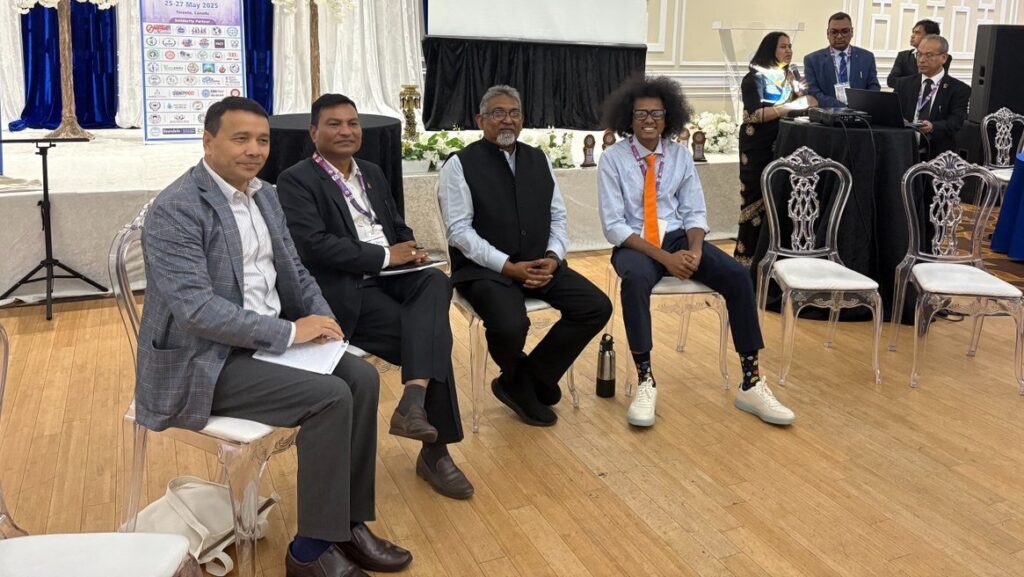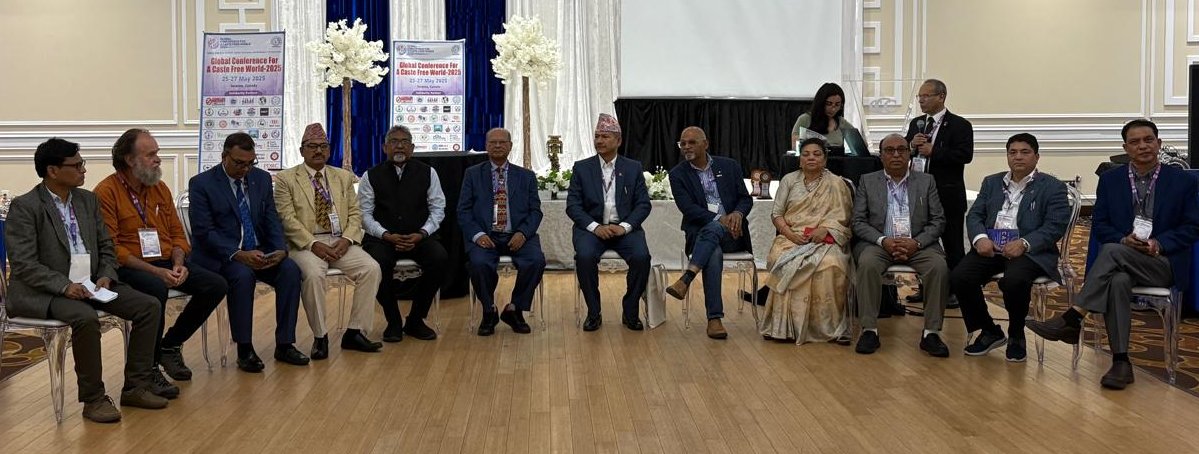Global leaders Call for Global Action to End Caste and Descent-Based Discrimination
At the Global Conference for a Caste Free World 2025, held in Toronto, Paul Divakar Namala delivered a powerful address that spotlighted the enduring global crisis of caste and descent-based discrimination.
His speech, titled “Addressing Caste and Descent-Based Discrimination: A Global Imperative,” weaving together deep historical insight, lived experiences of oppressed communities, appealed for an urgent call to action.
Santosh Bishwkarma, President of Sahayata – International Alliance for Social Justice, highlighted the global scale of caste-based and race-based discrimination, noting that over 250 million people continue to face systemic oppression on the basis of race, colour, ethnicity, and caste. “What began as a deeply rooted issue in South Asia,” he stated, “has now taken a global form, demanding international attention and unified action.”
He underscored the conference's commitment to collective solutions through strategic dialogue, policy reform, and international cooperation. The 2025 conference will focus on exchanging best practices and advancing collaborative frameworks to address discrimination globally, while giving special attention to the situation in Nepal. The event will culminate in the release of the Toronto Declaration—a comprehensive set of recommendations aimed at guiding future efforts by civil society, educational institutions, governments, and international organisations. “We call upon all allies, advocates, and change-makers to join us in this historic movement,” said Mr. Bishwkarma, “Your participation, support, and solidarity are crucial for building a caste-free, just world for all.”
Adding the voice of governmental leadership, Hon'ble Rupa B.K., State Minister for the Ministry of Forest and Environment, Government of Nepal, expressed strong support for the initiative. Acknowledging the disproportionate impact of climate change on Dalits and marginalised communities, she stressed the importance of exploring the intersection between environmental justice and social inequality at the conference. “This conference is a significant milestone in the global movement towards equality and the abolition of caste-based discrimination and atrocities, especially in countries like Nepal,” she said.
Reaffirming Nepal's commitment, she added, “On behalf of the Government of Nepal, I wish the conference great success and reaffirm my commitment to implementing its outcomes. Together, let us build a just, equitable, and caste-free world.”

Speaking at the event, Dr. Drona Prakash Rasali, Director of the Nepaldalitinfo International Network in Canada, examines the persistent issue of caste-based discrimination in Nepal within the broader context of the country's human rights trajectory. Drawing on data from the Human Rights Index compiled by V-Dem and processed by Our World in Data, the analysis shows that Nepal has made notable strides in its democratic development, particularly following key political transitions in 1951, 1959, 1991, and 2015. Despite improvements in democratic governance, the reality on the ground reveals a significant gap between legal progress and lived experiences, especially for Dalit communities.
Legal protections such as the Caste-Based Discrimination and Untouchability Act (2011) and the 2015 Constitution have formally criminalised caste-based discrimination. However, systemic exclusion continues to manifest across political representation, education, employment, and access to justice. The National Human Rights Commission recorded a sharp increase in reported caste-based discrimination cases—from 49 in 2019 to 753 in 2020—including 34 murders, many involving Dalit individuals in inter-caste relationships. Dalit women, in particular, face compounded discrimination, experiencing heightened levels of violence, exclusion, and exploitative labour conditions.
Economically and socially, Dalits remain among the most marginalised groups in Nepal. Although they constitute over 13 percent of the population, they are significantly underrepresented in leadership roles and resource allocation. The National Social Exclusion Survey (2018) highlights the severe disparities faced by Hill Dalits and Terai Dalits across various dimensions of discrimination.
While Nepal's Human Rights Index reflects an upward trend, especially post-2006, the persistence of caste-based discrimination underscores the disconnect between policy and practice. Dr. Rasali calls for more effective enforcement of existing laws, educational reforms that challenge caste hierarchies, grassroots empowerment of Dalit communities, and sustained monitoring of human rights progress to ensure genuine inclusivity and equality.
In his address, Paul Divakar urged that the abolition of caste and descent discrimination cannot be left to individual communities or nations alone—it must be tackled through global, intersectional, and collaborative action. He emphasized the importance of cross-border learning, the sharing of strategies, and the formation of alliances between civil society organizations, academic institutions, and government actors. Only through a united front, he said, can the historical wounds inflicted by caste and descent-based exclusion be healed.
Divakar's address was also deeply rooted in global human rights commitments. He emphasized how caste and descent-based discrimination violates the very principles enshrined in international frameworks like the Universal Declaration of Human Rights, the International Covenant on Civil and Political Rights, and the Sustainable Development Goals (SDGs). In particular, he highlighted how SDG targets on reducing inequality, ensuring inclusive societies, and promoting access to justice remain far out of reach for CDWDs unless nations make a deliberate and sustained effort to dismantle entrenched hierarchies.
Paul Divakar Namala is a globally recognized human rights advocate, best known for his tireless work on behalf of Descent Communities—socially marginalized groups across the world who suffer systemic exclusion due to caste hierarchies and ancestral occupations. With a career spanning decades, Divakar has been instrumental in organizing and amplifying the voices of Dalits in South Asia, Buraku in Japan, Roma in Europe, Haratine in Mauritania, Osu in Nigeria, Al-Akhdam in Yemen, and Quilombola and Pelenque communities in Latin America. He currently serves as the Convenor of the Global Forum of Descent Communities (GFoD), a role through which he engages with regional bodies and the United Nations to push for recognition, protection, and justice for these communities. Divakar's contributions have left a significant mark on international and grassroots advocacy alike.
In his address, Divakar painted a sobering picture of the global realities faced by Communities Discriminated on Work and Descent (CDWD). Despite cultural and geographical differences, these communities share common experiences of exclusion, segregation, and violence. Historically forced into dehumanizing and stigmatized labor, CDWDs continue to endure structural barriers in accessing education, employment, healthcare, housing, and political participation. In many cases, their suffering remains invisible—partly due to the lack of data and formal recognition, and partly due to the persistence of social stigma that relegates them to the periphery of public consciousness.
He detailed the multilayered nature of discrimination faced by CDWD. From segregated living and daily humiliation in India's caste-bound villages to violent hate crimes and police brutality against the Roma in Europe, the systemic nature of this oppression transcends borders. Legal exclusion and underrepresentation in governance further compound the injustice, weakening the ability of these communities to seek redress or protection. For Divakar, the struggle is not merely about social mobility—it is about dignity, justice, and the reclamation of humanity.
A Global Event for a shared dream
The broader context of the conference resonated with Divakar's message. The Global Conference for a Caste Free World 2025 brought together policy-makers, activists, academics, civil society practitioners, and students from across continents. The goal was ambitious: to build global solidarity toward the abolition of caste discrimination, share knowledge and lived experiences, and create actionable pathways for policy reform, reparation, and cultural transformation. Panels and workshops spanned a wide range of topics—from the intersection of caste and gender to the use of digital technology in anti-caste advocacy—and offered both scholarly insights and grassroots perspectives.
As the conference came to a close, the Toronto Declaration was adopted—an emphatic and uncompromising call for global action. Rooted in the understanding that humanity's origins lie in natural evolution and not in divinely ordained social orders, the declaration recognized that caste and racial hierarchies are man-made constructs that have persisted through millennia, particularly in regions like the Indus Valley, where agriculture and stratified social systems took shape simultaneously.
The declaration set a firm deadline—the end of 2025—for the complete eradication of caste and race-based discrimination, with an additional ten-year transition period granted to nations lagging behind. It called for the dismantling of institutional structures that uphold casteism through legal reform, economic redress, and cultural change. The document will be submitted to national governments, human rights bodies, and the United Nations Office of the High Commissioner for Human Rights (UN OHCHR), pushing the global community to honor its moral and legal obligations.
In his concluding remarks, Paul Divakar reminded the audience that “the time for action is now.” The fight against caste discrimination is not only a South Asian or African issue—it is a global human rights challenge that affects millions. By speaking truth to power, fostering solidarity, and refusing to be silenced, Divakar affirmed that a caste-free world is not a utopian ideal—it is an achievable imperative, and one that must begin with all of us, here and now.
A major theme of his address was solidarity. Paul Divakar urged that the abolition of caste and descent discrimination cannot be left to individual communities or nations alone—it must be tackled through global, intersectional, and collaborative action. He emphasized the importance of cross-border learning, the sharing of strategies, and the formation of alliances between civil society organizations, academic institutions, and government actors. Only through a united front, he said, can the historical wounds inflicted by caste and descent-based exclusion be healed.
Also Read: Land Governance and Right to Adequate Housing in Mauritania: Key challenges & recommendations


